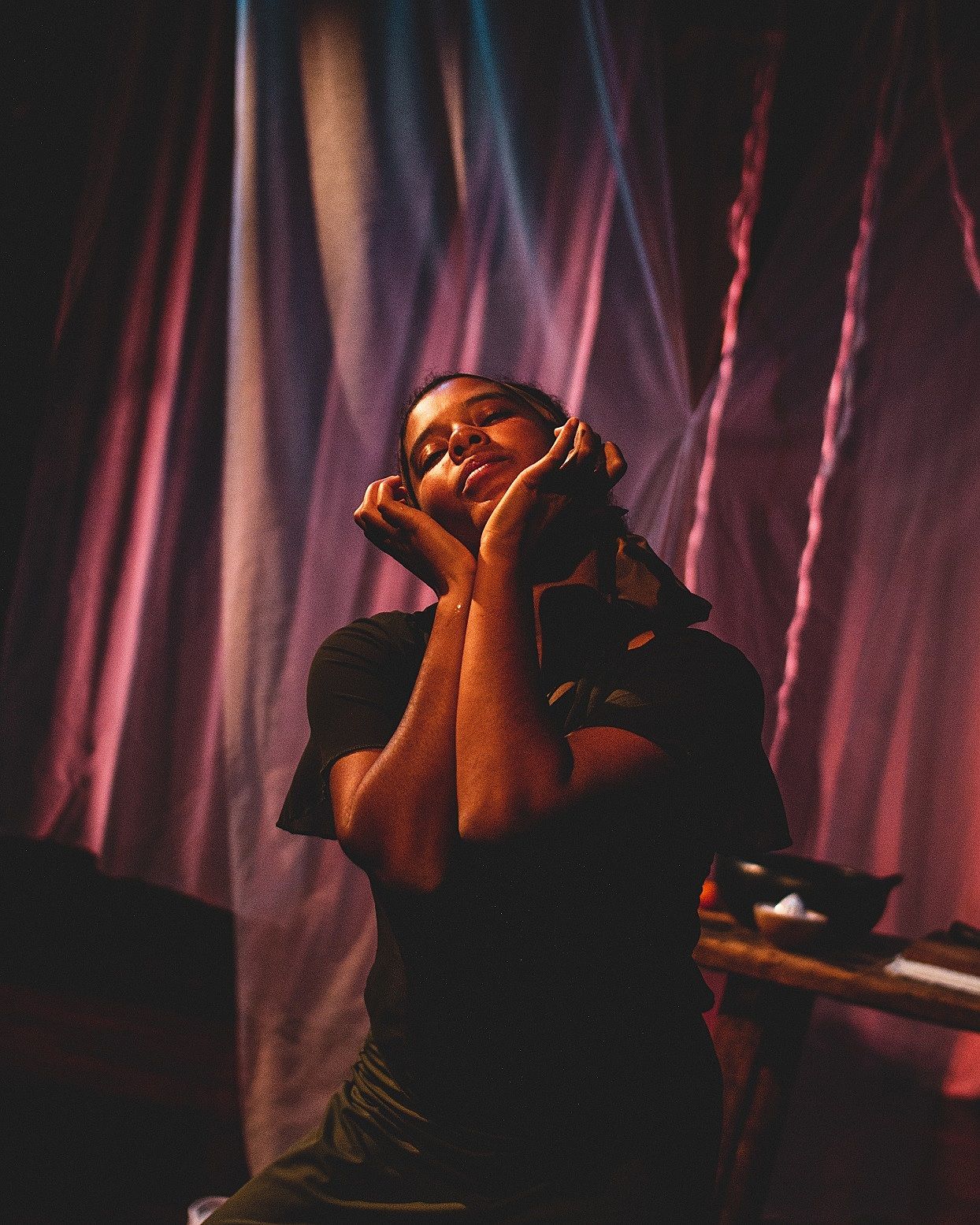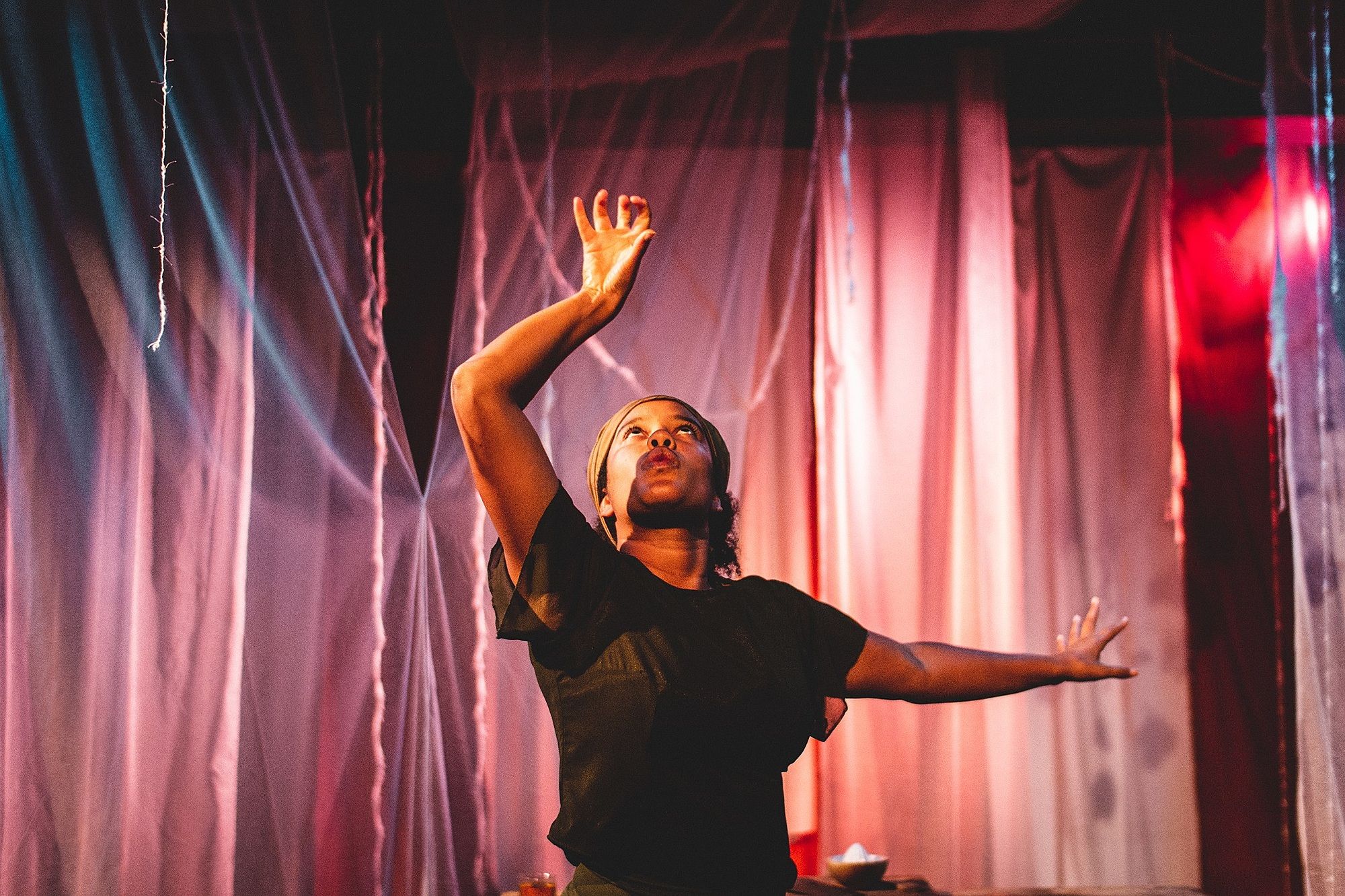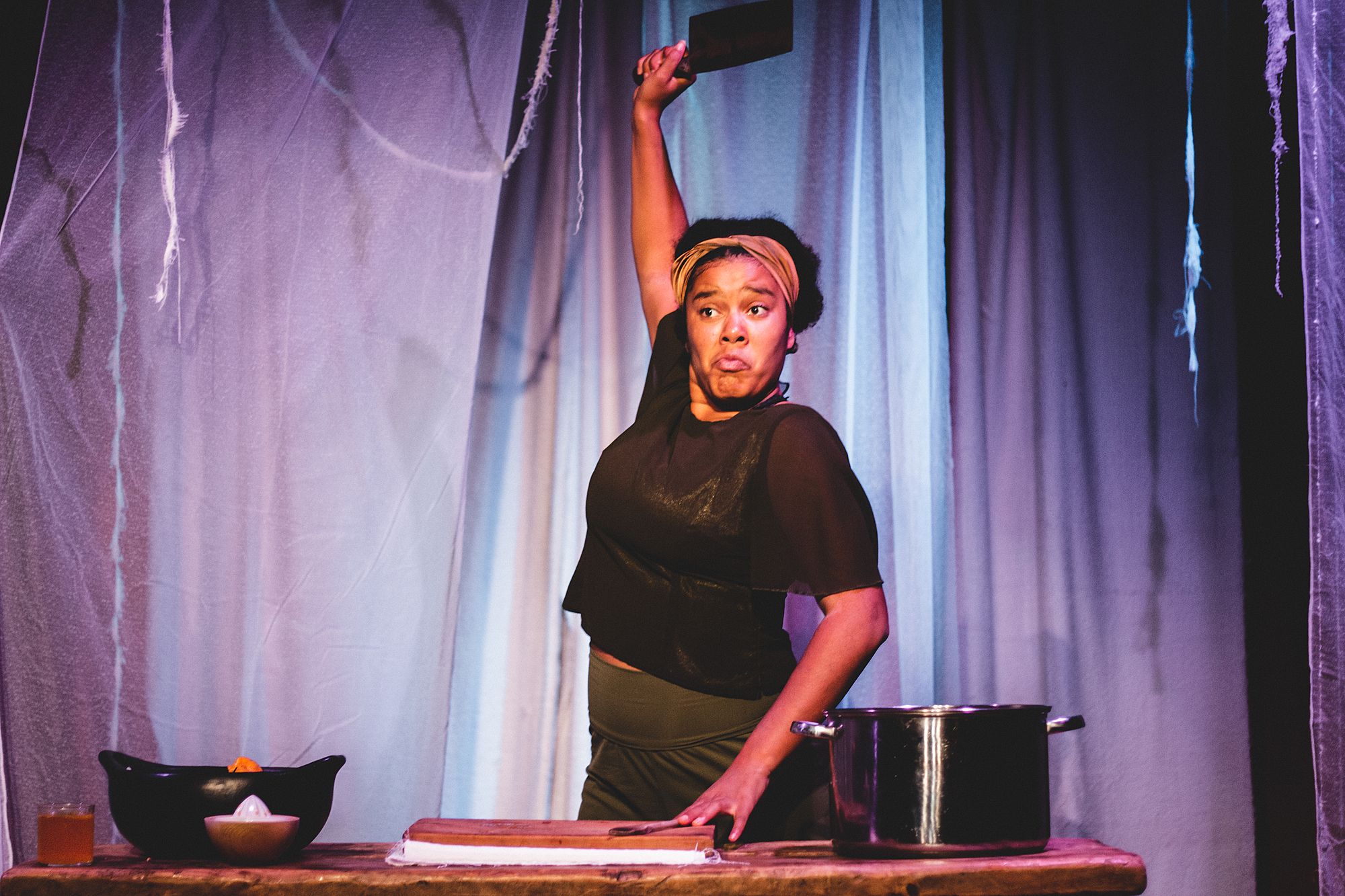Playing the Good Immigrant: A Review of Woman of Citrus
New Volumes critic Waveney Russ digs into the decolonising power of Grace Bentley's new one-woman solo at Basement Theatre.
New Volumes critic Waveney Russ digs into the decolonising power of Grace Bentley's new one-woman solo at Basement Theatre.
Grace Bentley is a young woman of Ghanaian-Pākehā descent, living in Kerikeri, the ‘Bay of Citrus’. She’s also a television reporter, speaking to the camera about a strange case of theft – all of the citrus has been stolen from the bay, and no one knows who to blame. She’s a Ghanaian father, speaking to his sister over the phone while she runs a cooking show back in Ghana. Or perhaps Grace is a highschooler, profiled by the police and interrogated about the strange citrus disappearance. Better yet, she’s an old crone who hunches over a mound of wet clay. Eyes wild, her neck snapping sideways, she shrieks, “I did it! I stole all of the citrus!”
In Woman of Citrus, writer-performer Grace Bentley offers fresh perspectives on minority empowerment, bigotry in New Zealand society, generation gaps in immigrant families and the power of women reclaiming space in post-colonial landscapes. Bentley leads us through her high school life against the backdrop of a citrus heist in town and explores the mysterious theft through five distinct characters, all played by Bentley herself. Employing a blend of physical theatre, dance, poetry and absurd character comedy, Bentley charts this incident and highlights the challenges of growing up in rural New Zealand as a mixed-race teenager.
The space is suffuse with a warm cloud of perfume. It contains a hint of moringa, a touch of ginger and plenty of orange. Grace perches idly on a single wooden workbench in the middle of the stage, dressed in deep sage, watching us in silence. There’s a dreamlike quality to the space, with pale gauze and white streams of cord draped from tree branches that hang from the rooftop. I’m taken back to a deep-seated memory of my mother curled over an orange on a beach in Sri Lanka, the rind balling up under her nails as her purchase slips and the orange falls to the sand. I wonder if other audience members associate feminine memories with the smell of citrus, with the acerbic juice of a tangelo or the sting of a lemon meeting fresh blood.
Woman of Citrus explores a series of tropes, all contained in the essay collection The Good Immigrant by Suleyman and Shukla, that highlight the standards that migrant families are either accepted into or judged to be apart from in dominant white culture. That pressure to conform to Pākehā society’s lofty expectations of migrant families, Shukla boils down to, “Integrate well. Move upwards in society. Be praised – until people worry that you’re doing too well, and then they remember that you’re foreign."
There’s no better backdrop to these pressures than predominantly-white rural New Zealand. Grace (that is, the teen version of herself that Bentley plays on stage) speaks on the challenges of living up to a model minority archetype: standing centre-stage during a high school speech competition, she reads from invisible cue cards that the ‘pinnacle of success’ for a ‘good mixed-race kid’ is becoming the head girl of her high school. By winning this position, she infers, she proves her validity and worth in a white-majority society, showing that she is dedicated to the sanctity of hard work and academic dedication like ‘the others’.
But the archetype is ultimately a red herring. Sliding a cue card to the back of the pile in her hands, Grace says the ‘race card’ is inevitably pulled on head prefects of colour, and the legitimacy of their leadership position is undermined by their ethnicity. This speech has wider implications: it’s well accepted that only exposing migrant children to minority success stories proves detrimental to their psychological well-being, educational outcomes and access to institutional support. It’s an archetype that ignores the different treatments of immigrant and refugee communities, simply lumping all minority experiences into one universal experience. But it’s also an archetype that keeps these kids anxious and quick to scrutinise themselves, like when a bad mixed-race kid steals all of the citrus in Kerikeri – and the police start profiling her over her Pākehā peers.
[Bentley] works to decolonise the stage, allying with other women and women of colour to produce a female-led show that reclaims typically the Pākehā, male-dominated spaces of New Zealand theatre.
Bentley also comments on the various sizes and shapes of bigotry in New Zealand. Bentley frames her experience of violent, dehumanising language towards New Zealanders of different ethnicities – in the same high school speech competition, Grace tells us about her first run-in with a kid who called her a racist slur. Grace recounts the microaggressions flung at her due to appearing different to her Pākehā cohort: other kids suggest that she straighten her afro-textured hair, and tell her that Seasonal Affective Disorder doesn’t affect people with high levels of melanin in their skin. Bentley highlights the alienation people of colour feel as a result of the social and cultural construct of ‘othering’, encouraging us to listen – the decent, baseline thing to do when people tell you about the racism they have experienced firsthand.
Othering immigrant communities is common in New Zealand. We’d like to think we’re more liberal than the United States, or more partial to unity than the United Kingdom, but media outlets continue to distribute political messages full of hatred and fear. These divisive messages continue to reach the communities that take to them with ease. Grace’s run-ins with a racist police officer and Pākehā reporter show that abject form of othering that our society claims to play no part in and illustrate how it prevents her from feeling like she belongs. These institutionalised figures profile, other and sensationalise her in the eyes of the public, stripping Grace’s identity back to the colour of her skin.
Bouncing between these characters – herself, her father, the reporter, the old woman who holds the secret to the citrus heist – Bentley relishes in navigating both her Ghanian and Pākehā identity while never embodying one label in its entirety. Each character exists as a whole person with unique accents and mannerisms; she’s never an empty vessel bouncing switching roles in and out, but a whole being deserving of empathy. Her performance calls to mind whakapapa, stretching both forward and backwards in time and space. “The seed you planted will never grow back the same,” she says; though the seed will always be an ancestor of a genealogical branch, it will never manifest in the same way its predecessors did.
With much of the performance shaped by comedy, it’s easy to forget the characters on stage live with the real-life grievances of migrant communities and people of colour in a colonised landscape. As Bentley parts the gauze curtains behind her workbench, she shoots us a knowing, fourth-wall-shattering stare: she’s not just telling a story, but sharing a lived reality. That reality extends to the stage, where Bentley is subjected to the dominance of the Western dramatic canon in our nation’s theatres. So she interrogates Western theatrical elements by using them alongside traditional Ghanaian culture: Afrobeat musical interludes drift between scenes, and Bentley invites the audience to participate in a traditional ritual where a blessing is recited into a beverage before handing the glass over. Bentley’s interrogation works to decolonise the stage, allying with other women and women of colour (director Jo Randerson, collaborator Ana Scotney, dramaturg Dione Joseph, lighting designer Amanda Tito and producer Ankita Singh) to produce a female-led show that reclaims typically the Pākehā, male-dominated spaces of New Zealand theatre.
Even with a runtime of less than 50 minutes, Woman of Citrus is both a fast-paced comedy and a generous analysis of the mixed-race experience in New Zealand. Bentley deals with the experience of mixed-race womanhood and the anxieties experienced by first and second generation immigrant families, attempting to live up to a ‘model migrant’ standard. Her generosity extends to the rare moments of vulnerability: there comes a moment where her jaw locks, her chin begins to wobble, and tears fill her eyes. She shares the struggle of being labelled not ‘white enough’ in her Pākehā community, and not ‘black enough’ to her African peers. “An orange is different from a grapefruit,” she says, “even though they are from the same variety.” The weight of identifying as Ghanaian-Pākehā and the ensuing racial ambiguity is stressful, a stress that the intractability of society can turn into a burden, and Woman of Citrus explores this with sensitivity.
There is no time more pertinent to be asking the question: where on our screens and stages do we find non-tokenistic representation of mixed-race kids, the kids who fail to fit neatly into one box of stereotypes, expectations and aspirations? Delivered with the fearlessness of youth and the lack of inhibitions that you’d expect around taboo issues of cultural and generational identity, Woman of Citrus starts a conversation about mixed-race identity in New Zealand that is gentle and humorous and powerfully certain of its purpose and its place.
Woman of Citrus runs from April 9 to 20 at Basement Theatre. Tickets available here.
Header image credit: Ankita Singh.
This piece is presented as part of our New Volumes critical writing partnership with Basement Theatre. Basement Theatre covers the costs of paying our writers while we retain all editorial control. You can read more about the programme here.




